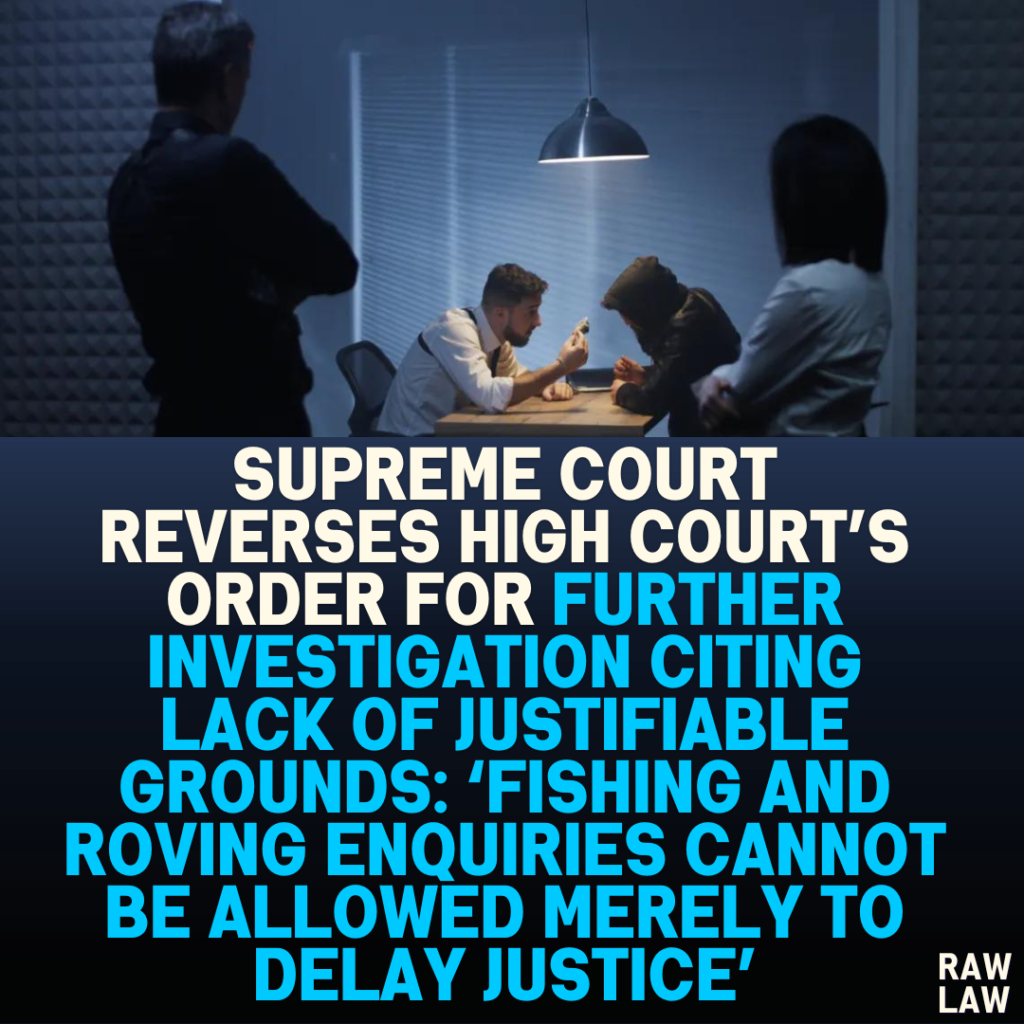Court’s Decision:
The Supreme Court set aside the Madras High Court’s order directing further investigation in a case related to the murder of the deceased. The court held that the High Court’s order lacked any justifiable grounds for allowing further investigation, especially when all necessary witnesses had been previously examined, and the original trial had almost concluded. The court emphasized that further investigations cannot be permitted for conducting “fishing and roving enquiries,” especially when the trial is at an advanced stage and no new substantial facts have come to light.
The Supreme Court also stated that “Delay in trial will cede to the pursuit of truth, however, a distinction should be made between cases where there exist genuine grounds to hold up the proceedings and cases where such grounds do not exist.” The trial court was directed to conclude the trial and pronounce the judgment within eight weeks from the date of the order.
Facts:
- The case pertains to a murder incident where the deceased was allegedly hacked to death by several accused while on a morning walk. An FIR was registered in March 2013, naming eight accused.
- In 2016, the prime witness (PW-1) was declared hostile and sought to be cross-examined by the prosecution. The wife of the deceased (PW-2) and other relatives were also examined in March 2017.
- The primary witness’s (PW-1) testimony became inconsistent during multiple examinations, raising doubts about the nature of the evidence.
- After the trial concluded, the wife of the deceased sought further investigation under Section 311 Cr.P.C., which was rejected by the trial court and subsequently confirmed by the High Court.
- Despite the trial nearing completion, a fresh application for further investigation under Section 173(8) of Cr.P.C. was filed in January 2020 by the wife of the deceased. This was allowed by the High Court, which led to the present appeal.
Issues:
The key issue before the Supreme Court was whether the High Court was justified in ordering further investigation at a stage when:
- The trial had already concluded.
- The primary witness (PW-1) had been examined multiple times.
- No new facts or evidence were brought to light justifying a reinvestigation.
Petitioner’s Arguments:
- The appellant argued that the application was a disguised attempt to reopen the proceedings under Section 311, which had already attained finality.
- It was contended that further investigation cannot be allowed after the trial has concluded unless substantial new facts have emerged.
- The High Court failed to consider the legal principles applicable to the case and the timing of the application.
Respondent’s Arguments:
- The respondent argued that further investigation was necessary to bring out the true facts of the case and serve the ends of justice.
- It was submitted that since PW-1 turned hostile, the prosecution should be allowed to summon additional witnesses to support its case.
- The additional charge sheet already prepared should be accepted in the interest of justice.
Analysis of the Law:
- The Supreme Court referred to Section 173(8) of Cr.P.C., which allows for further investigation even after the submission of a final report, provided there is new and substantive evidence.
- The court observed that the power of ordering further investigation must be exercised sparingly and only when it serves the ends of justice. It cannot be invoked merely to delay the proceedings or to fill up lacunae.
- In the present case, the court found no fresh evidence or substantial reason justifying the High Court’s order for reinvestigation.
Precedent Analysis:
- The court cited Pooja Pal vs. Union of India & Ors., where it was held that further investigation can be ordered only if new facts come to light that could affect the outcome.
- Reference was also made to Vinay Tyagi vs. Irshad Ali alias Deepak & Ors., which emphasized that the power to order further investigation is a significant power that must be exercised sparingly and only in exceptional cases.
Court’s Reasoning:
The court concluded that the High Court erred in allowing further investigation based on vague grounds. The High Court failed to record any substantial reasons for its order, and the respondent’s repeated attempts to seek reinvestigation appeared to be motivated by a desire to delay the proceedings rather than a genuine need for further inquiry.
The court stated, “Fishing and roving enquiries cannot be permitted when the very applicant has not provided any new facts in her evidence.” It emphasized that justice should be timely and not delayed unnecessarily due to frivolous applications.
Conclusion:
The Supreme Court set aside the High Court’s order directing further investigation and dismissed the application under Section 173(8) Cr.P.C. filed by the respondent. The court directed the trial court to proceed with final arguments and conclude the trial within eight weeks.
Implications:
This ruling underscores the limited scope for allowing further investigation once the trial has commenced and highlights the need to avoid unnecessary delays in the justice delivery process. It reaffirms the principle that further investigation cannot be permitted simply to conduct “fishing and roving enquiries” without any new material evidence coming to light. This judgment will serve as a guideline for the lower courts in assessing similar applications for further investigation in the future.



